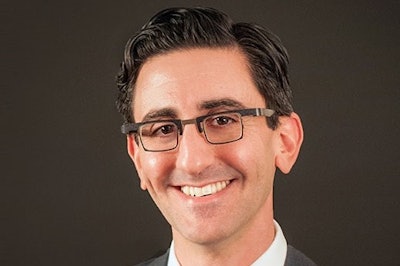Nicholas Cochrane never thought he would be a teacher one day. He grew up in the projects, and most of his friends and peers ended up in jail or lost their lives. He assumed his path would be similar, and he dropped out of high school at 16. Eventually, he found his way back to education 13 years later.
 Nicholas Cochrane, associate professor of business and economics at Mount Wachusett Community College.
Nicholas Cochrane, associate professor of business and economics at Mount Wachusett Community College.
Now, Cochrane is an associate professor of business and economics at Mount Wachusett Community College (MWCC) in rural Gardner, Mass., and he has made it his mission to ensure his students fit in and find a sense of belonging in their school.
Cochrane is a member of the Faculty Academy, a statewide initiative that trains faculty in a pedagogy called “Real Talk,” created by Dr. Paul Hernandez, senior advisor to the president and CEO at Achieving the Dream (ATD), a partner network of over 300 community colleges working to equitize higher education. The methodology connects students’ real lives to the classroom, engaging them in personal conversation and critical thinking about hypothetical scenarios.
“Students feel as though a safe space is created in the classroom, and they hear these stories with other students as well that help them fit into the classroom environment,” said Cochrane. “It’s difficult to talk about these issues, especially for students of color—and to bring this up in the classroom setting is very helpful and relatable.”
Cochrane surveys his students after each class for anecdotal feedback, but the Faculty Academy also tracks data which reveals how much better students perform overall after taking courses that integrate Real Talk. Students who take Real Talk courses express greater enjoyment and fulfillment in class, dropping those courses at significantly lower rates than those in classes without Real Talk. Real Talk students are also more likely to persist.
Importantly, MWCC deconstructed these data and discovered that students of color responded well to Real Talk pedagogy. Between Fall 2020 and Fall 2021, 62.1% of Real Talk students of color persisted into their next year of study. Students who did not take Real Talk courses persisted at a rate of 36.7%, over 25 percentage points less.
Cochrane’s experience with Real Talk underlined the connection between student belonging and student performance. He shared his story at ATD’s latest webinar, The Tools We Have: Harnessing Effective Pedagogy, Data, and Resources to Create a Sense of Belonging and Increase Success in the Classroom.
“There are a wide range of practices that can cultivate a sense of belonging,” said Jonathan Iuzzini, director of teaching and learning at ATD. These practices, Iuzzini said, range from highly tested and researched models that have been proved to cultivate belonging, like active learning and holistic pedagogy, to practices like Real Talk, a newer, emergent pedagogy.
 Jonathan Iuzzini, director of teaching and learning at Achieving the Dream.
Jonathan Iuzzini, director of teaching and learning at Achieving the Dream.
Common elements of these newer pedagogies include faculty coming together to design learning experiences that allow students to explore new ideas and ask questions while solving meaningful problems. Students make connections between their academic and real-life experiences, bringing learning together with community, culture, and personal feelings.
A 2021 study of community colleges in Tennessee by the Lumina Foundation, a policy institute that works to make postsecondary education more accessible, found that high-impact practices not only increase retention but also encourage students to take on more credits each semester and increases the likelihood they complete math and English courses in their first year.
“On those same metrics (retention, credits, math and English), equity gaps are starting to close as instructors use these practices,” said Iuzzini. “The data is compelling. When we introduce these practices, it makes a difference. It cultivates a sense of belonging, and when they feel they belong, they dedicate themselves, which leads to deeper learning, which means greater likelihood of success and completion.”
For Cochrane, the positive results of Real Talk pedagogy was not just felt by his students. The Faculty Academy has become a strong community for him, a place to share ideas and be vulnerable. And, after incorporating Real Talk in his classroom, Cochrane said he began to enjoy teaching more too. The practice, he said, has helped his empathy and creativity blossom.
“It reignited my passion for the profession,” he said. “Students would open up to me and share personal stories of struggle that they never did before. I have been able to build better, longer-lasting relationships with them.”
Liann Herder can be reached at [email protected].




















